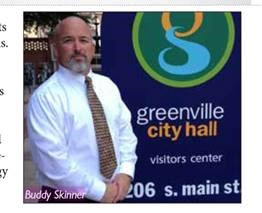By Buddy Skinner, president of the Building Officials Association of SC and Building Official for the City of Greenville
The signing of H3649 by Gov. Henry McMaster this week is a milestone for the Building Officials Association of SC and proves that our partnering with the Municipal Association of SC in 2017 was a positive step for our membership and our vocation as building code professionals.
The goal of the legislation was modification of the Engineer’s Practice Act to make it clear when an engineer’s seal was needed on construction documents for non-residential structures.
In 2016, the Act was changed to require design specifications be sealed by an engineer for nearly all non-residential structures, no matter their size. Prior to the change in 2016, an engineer’s seal was required only in certain, specific circumstances.
The change to the Act in 2016 caused confusion among building officials and the construction industry. But because chapter one of the International Building Code requires strict compliance with state statutes, code officials could only accept signed and sealed plan submittals for all projects requiring permits.

To restore clarity for building officials and relieve the regulatory burden on business, BOASC sought to revert to the language in the law that had worked so well prior to 2016. H3649 accomplished that goal and is now in effect.
Throughout the development and passage of H3649, BOASC members were able to network with multiple stakeholders to discuss and find agreeable solutions to the changes the bill proposed. BOASC’s involvement in the bill also raised our association’s profile within state government since many legislators didn’t even know it existed!
The catalyst for our success with this legislation was the Municipal Association and its staff. Without their guidance, knowledge and supervision, we would not have known where to start. Their team was able to put our membership in the right places and encouraged us to talk with the right people to accomplish the goal that we were seeking on this bill and others.
Thanks to all of the BOASC members, their municipalities and counties for their work on this important change.
The week of March 11 is recognized as Sunshine Week by the newspaper industry and the S.C. Press Association. It's also a good time for local elected leaders to highlight their own open government and transparency efforts.
The special section in the March issue of Uptown focuses on open government with feature stories spotlighting changes to the Freedom of Information Act, streaming council meetings and public access to digital records.
Cities of all sizes are working hard to increase access to public meetings and public records. Streaming of public meetings and digitizing of public records are
becoming increasingly common - and much less expensive to produce. Uptown articles spotlight cities that are taking the lead to make sure their residents have
easy access to their city government activities.
Legislation that passed in 2017 made substantial changes to the Freedom of Information Act. Changes addressed digital records, charges for copies, updating timing requirements, and the option for cities to seek court guidance on unduly broad or repetitive requests.
Another aspect of the 2017 FOIA legislation is changes to the Family Privacy Protection Act. Previously, it was
illegal for an individual to get from a state agency any personal information that would be used for commercial solicitation. But now,
the law expands that offense to include local governments. That means municipalities must not only provide notice of
the prohibition to requesting parties but must also take steps to ensure
that no individual or entity "obtains or distributes" this information
for commercial solicitation. Read the article to learn more about what cities can do to protect residents' privacy.


